As Georgia shakes off the shackles of its Soviet past, a new scheme aims to revive Tskalutbo's abandoned sanatoriums and turn the town into a world-class spa destination once again.
Electroshock therapy? Sounds painful. Colonic hydrotherapy? I'll pass. How about ultrasound laser therapy? I'm not even sure what that is. However, what I did know as I read the treatment list while checking into the Legends Spa Resort in Tskaltubo, Georgia, is these weren't the soothing therapies I'd expected to find in a spa town.
Founded on bubbling hot springs, Tskaltubo (located a 15-minute drive from the city of Kutaisi) once welcomed hundreds of thousands of Soviet citizens on state-prescribed holidays every year. In its heyday, Tskaltubo was one of the largest spa towns in the Soviet Union, but when the USSR collapsed in 1991, its sanatoriums were abandoned.
But now, as an independent Georgia continues to shake off the shackles of its Soviet past, locals are now reviving the derelict buildings and broken sanatoriums and turning the town into a world-class spa destination once again.
There were around 22 sanatoriums here in the Soviet era," said Lasha Kutateladze, a Tskaltubo local and a guide at Budget Georgia who organises tours of the spa town. "Trains would arrive from all over the USSR. Tskaltubo has more than 2,000 natural springs, and the mineral water is so special they used to claim that people arrived in wheelchairs and left on their own feet."
I'd met Kutateladze by the grand entrance to Legends Spa Resort (I'd passed on the electroshock therapy), one of Tskaltubo's original sanatoriums that reopened in 2011. Kutateladze explained how sanatoriums were a peculiarly Soviet institution that had hotel lodgings, restaurants, entertainment, spas and medical facilities all under one roof. Soviet citizens were allocated at least two weeks of holiday a year and many would visit spa towns like Tskaltubo on state-sponsored trips where they could unwind and recuperate in these state-owned health retreats.
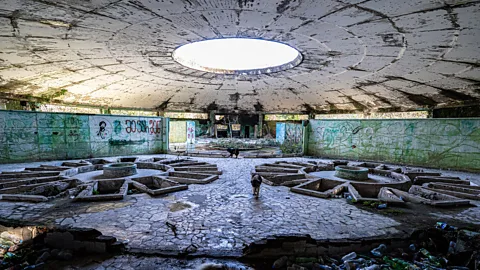 Richard Collett
Richard CollettKutateladze showed me through Tskaltubo's Balneological Zone, a central area where natural mineral waters are channelled into bathhouses and springs, each with treatment and medical facilities. There were as many as nine of these dedicated bathhouse spas, which, unlike sanatoriums, didn't have hotel rooms and restaurants.
We walked inside the remnants of Bathhouse No 8 where cracked tiles were covered in algae and stray dogs sought shelter under a UFO-like rooftop that was straight out of the Brutalist handbook. On the main road, the faded edifice of Sanatorium Savane was draped in creeping ivy, and next door, Sanatorium Imereti's broken hallways were strewn with the debris of a fallen empire, including rusted bed frames, faded newspapers printed in Cyrillic and even the odd black-and-white photo of former Soviet spa-goers.
But the look of romantic abandonment is deceiving in Tskaltubo, and if you look closer at the surrounding hotels and sanatoriums, you'll see washing hanging from rusted balconies and perhaps even smell baked khachapuri in the corridors. For decades, refugees escaping the wars in Abkhazia and South Ossetia that followed the USSR's breakup, have lived in the town's hotels.
"I've lived here 30 years," said Gigla Chofliani, a taxi driver and friend of Kutateladze who we met on the third floor of Sanatorium Gelati. "Originally about 15 families were living in Sanatorium Gelatil. My son, he's 17 now, and he grew up here."
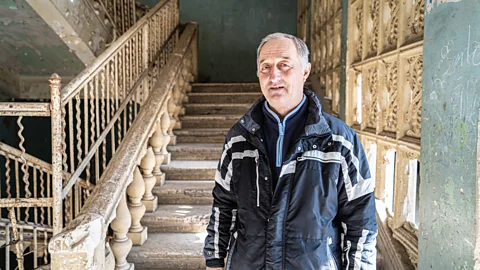 Richard Collett
Richard CollettLike hundreds of other families living in Tskaltubo, Chofliani fled his home in Abkhazia – a Black Sea region that broke away from Georgia during the chaos following the fall of the Soviet Union – in 1992. Tskaltubo's hotels and sanatoriums were used as emergency housing, but it wasn't until 2010 that the Georgian government had the resources to begin rehoming refugees. Chofliani now describes himself as the "Robinson Crusoe" of Sanatorium Gelati because he's one of the last residents waiting to move into purpose-built apartments on the edge of Tskaltubo.
As we explored more of the sanatoriums, Kutateladze explained how times are changing here. "When I was growing up, 50 families lived in Sanatorium Medea," he said as we walked through yet another derelict Soviet hulk. "Now there are only a few. The old hotels and sanatoriums are all being put up for sale, and people are moving to the new apartments."
Gvanca Bzhania moved into one such new apartment with her family two years ago, and she invited us into her home on a street named Abkhazeti – in memory of the refugees' lost homeland – later that afternoon. "Our generation is the lost generation," she said mournfully, explaining how she fled her home in Abkhazia when she was 12 years old. "So many talented people couldn't complete their schooling or enjoy the opportunities they deserved."
Bzhania, a self-taught artist, grew up in one of Tskaltubo's hotels, and her husband grew up in the one next door. She's adamant their kids will have a better start to life than they did. "Before the war, Tskaltubo's hotels and sanatoriums needed cooks, doctors, receptionists, cleaners and masseuses," she said, pointing out how the resurrection of the old spa industry will provide more robust opportunities for locals. "The same can happen again. When the springs and hotels are refurbished, there'll be more jobs, and we'll have more visitors to sell homemade products to; like honey, wine and artworks."
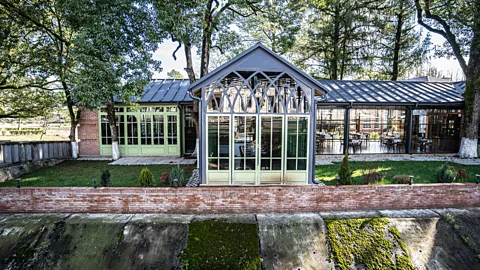 Richard Collett
Richard CollettBzhania's wishes may soon come true given that in 2022, 14 of the old sanatoriums were sold to investors as part of the New Life for Tskaltubo scheme that aims to revitalise the town. Many of the sanatoriums are now construction sites, and a plethora of new restaurants and hotels now stand in the main square among old Soviet reliefs and statues.
As we walked back to the Balneological Zone, Kutateladze explained how he leads at least one tour of Tskaltubo a week, and he's seen an increase in Middle Eastern tourists arriving in winter to enjoy the snow-capped mountain scenery surrounding the town. Of course, the already-refurbished spas and hotels are a hit with Georgians – there was a raucous wedding party throughout my stay at Legends Spa Resort – and with tourists from other former Soviet countries.
There's certainly enough Soviet nostalgia to go around, but some of it is proving divisive, as Kutateladze explained when we stopped outside the white-washed columns marking the entrance to refurbished Spring No 6, one of the dedicated spa and treatment centres in the Balnealogical Zone.
"Can you tell me who that man on the relief is?" he asked, pointing up at a pristine carving above the spa entrance. "That's Stalin. This was one of the most popular spas in the Soviet days, and rumour has it that Stalin visited on at least three separate occasions."
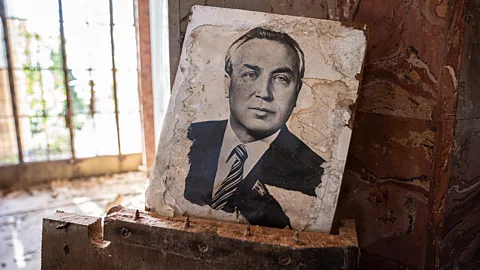 Richard Collett
Richard CollettThis wasn't the first I'd heard of Stalin's possible visits to Tskaltubo. After I'd checked into Legends Spa Resort, a security guard had shown me to a damp room in an empty wing of the vast sanatorium. The room had been eerily preserved as a memento to Stalin, Georgia's most infamous son (he was born in Gori, a city to the east of Tskaltubo), as he supposedly slept there during his stay.
More like this:
-Five of the best places to eat in Batumi, Georgia
"The older generation have attached these stories and legends to him," Kutateladze said, as we stepped inside Spring No 6, where technicians in long white coats ushered guests across marble floors and into treatment rooms. "The propaganda and brainwashing affected a lot of people, but how can you idolise him when he killed millions?"
Luiza Chakvetadze, a manager at Spring No 6, explained how guests still love the old Soviet-style treatments too, which are often medicinal rather than purely therapeutic. "The doctor checks you over first," she explained from behind a grand marble counter, adding how Tskaltubo's mineral waters are naturally radon-carbon-rich and bubble out at a temperature between 33-35C. "We have 20 different kinds of procedures targeting everything from spinal diseases to cardiovascular problems."
Kutateladze told me that Spring No.6 is his favourite treatment centre in Tskaltubo. He regularly visits for sports massages, and he has friends who have been treated here for high blood pressure, varicose veins and even weight loss. Doctors typically prescribe a combination of treatments, designing bespoke plans that can incorporate everything from mineral baths to hydro massages, and which can take place over multiple days.
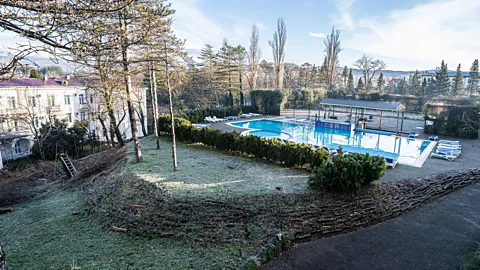 Richard Collett
Richard CollettI turned down another offer of electroshock therapy, though, a little disappointed that after my long walking tour with Kutateladze, there wasn't a simple hot tub I could sink into. Maybe I was just being squeamish because a steady stream of spa-goers were walking through the doors for treatments, a sign that Tskaltubo truly is on the up again.
Change is happening here as it is everywhere in Georgia, and Kutateladze showed me around Springs No 4 and 11, which have also reopened. While Tskaltubo's train station still lies rusting, its windowpanes shattered on cracked, ivy-clad floors, the town is just a 25-minute drive from Kutaisi International Airport, offering easy connections to much of Europe.
As tourism booms in Georgia – the National Statistics Office of Georgia recorded 7.1 million international visitors in 2023, an increase of 30.3% from 2022 – Tskaltubo is well placed to capitalise through its spa history. Maybe next time I visit, I'll even brave the electroshock therapy.
BBC Travel's Well World is a global take on wellness that explores different ways that cultures the world over strive for a healthy lifestyle.


